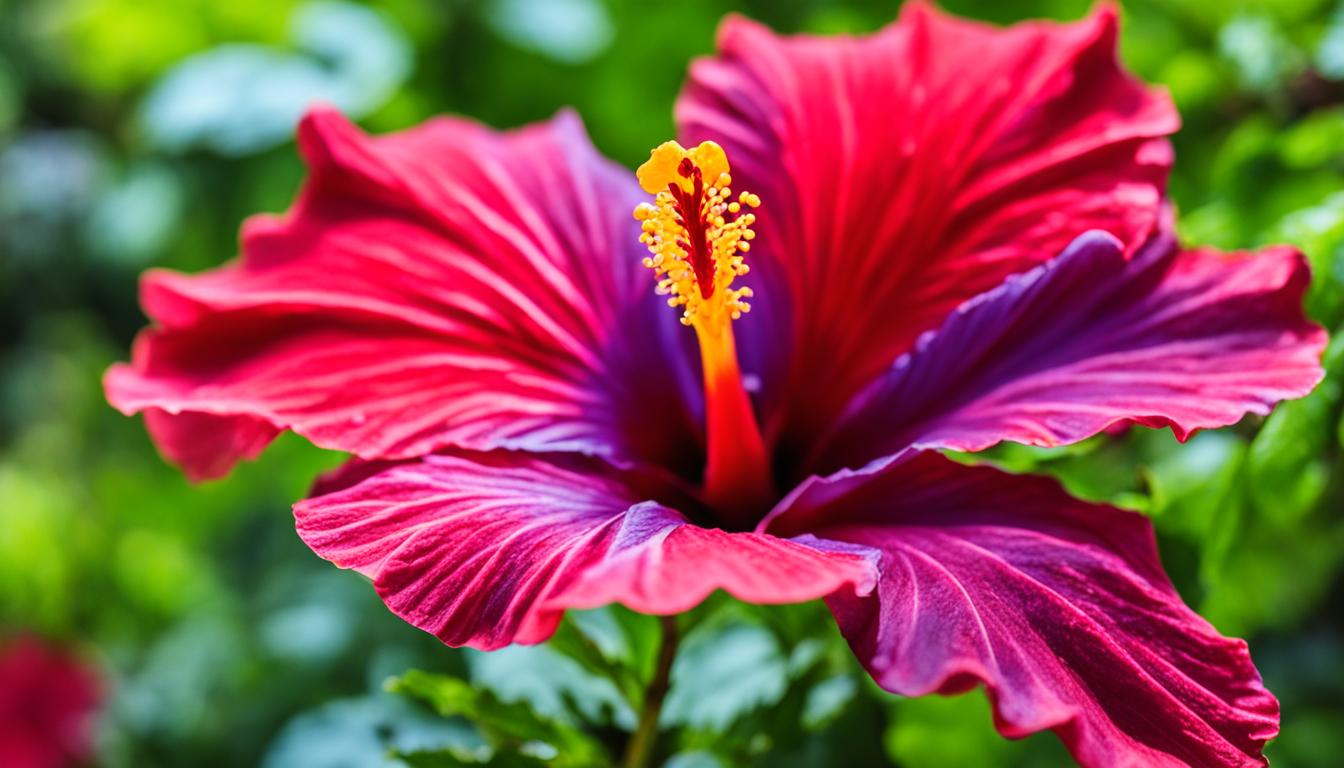Did you know that hibiscus-based beverages have a rich cultural and historical significance in the African diaspora? These drinks, enjoyed in various forms and preparations across the Caribbean, Latin America, and Africa, are not just a refreshing treat but also carry a deep connection to the past. So, how did hibiscus become such a cherished part of African diasporic cuisine? Let’s explore the journey of hibiscus in the African diaspora and discover the cultural significance it holds.
Key Takeaways:
- Hibiscus-based beverages have a significant cultural and historical role in the African diaspora.
- Hibiscus drinks are enjoyed in various forms and preparations across the Caribbean, Latin America, and Africa.
- The use of hibiscus in these drinks can be traced back to its introduction during the transatlantic slave trade.
- Hibiscus beverages symbolize cultural heritage, celebration, and connection in the African diaspora.
- The versatility of hibiscus allows for the creation of various recipes, catering to different tastes and preferences.
The Significance of Hibiscus in African Diasporic Celebrations
Hibiscus holds a special place in the hearts of the African diaspora, particularly during celebratory gatherings and cultural practices. One of the most notable celebrations where hibiscus takes center stage is Christmas in the Caribbean. During this festive time, hibiscus-based drinks like sorrel are a traditional part of the culinary lineup.
“The vibrant red color of the hibiscus flowers adds a festive touch to these celebrations.”
With its vibrant red hue, hibiscus flowers symbolize joy, vitality, and cultural resilience. This symbolism resonates deeply with the African diaspora, reminding us of the strength and perseverance of our ancestors. The presence of hibiscus-based drinks at celebratory events serves as a powerful reminder of our shared history and heritage.
Furthermore, hibiscus is not just a beverage ingredient but a testament to the cultural connections among African diasporic communities. It is a unifying element that transcends geographical borders and brings people together. The significance of hibiscus in African culture stretches beyond festive occasions, as it is also cherished in everyday life.
Hibiscus flower symbolism is an integral part of the African diasporic experience, serving as a visual representation of our collective heritage and celebration of cultural diversity.
Hibiscus Beverages as a Bridge Between Cultures
Hibiscus beverages, such as bissap, sorrel, and agua de Jamaica, have transcended borders and become a bridge between cultures. The consumption of these drinks connects people from different parts of the African diaspora, evoking a sense of familiarity and shared experiences.
For example, the dried roselle found in popular markets in London connects the Caribbean community in the UK to the African continent. In this way, hibiscus serves as a representation of the unified origins and shared food traditions of the African diaspora.
Whether enjoyed in the Caribbean, Latin America, Africa, or across the globe, hibiscus beverages symbolize cultural heritage and serve as a tangible reminder of the interconnectedness of diverse communities.
The vibrant red color and distinct flavor of hibiscus make it a beloved ingredient in various traditional recipes. Its versatility allows for the creation of diverse hibiscus-based drinks, each with its unique twist and cultural significance.
Hibiscus: Celebrating Unity and Diversity
“Hibiscus beverages bring us together, regardless of our geographic location. It’s a celebration of unity and diversity, showcasing our shared heritage and the beauty of African culture.”
– Olubunmi, a Nigerian diaspora community member
- Hibiscus drinks serve as a common thread that ties together communities within the African diaspora, fostering a sense of connection and pride.
- These beverages can be found in celebrations, family gatherings, and everyday life, solidifying their position as a cultural staple.
- By savoring hibiscus-based drinks, individuals honor their roots and the legacy of their ancestors, contributing to the preservation of African traditions.

Through hibiscus beverages, the African diaspora continues to celebrate its vibrant culture, strengthen bonds, and foster a sense of community across the globe. From the Caribbean to London, these drinks embody the spirit of unity and the enduring legacy of African culinary traditions.
The Legacy of Red Drinks in African American Culinary Traditions
Red drinks hold a special place in African American culinary traditions. These drinks, often made with hibiscus and other ingredients like kola nuts, have been a part of African American culture for centuries. Red drinks are associated with celebrations, particularly Juneteenth, which commemorates the emancipation of enslaved African Americans.
Besides their cultural significance, hibiscus-based drinks also offer health benefits. Hibiscus tea, for example, is known for its potential to lower blood pressure and cholesterol levels.
Hibiscus tea, commonly known as “sorrel” or “roselle tea,” is made by steeping dried hibiscus petals in hot water. The beverage has a tart, cranberry-like flavor that is both refreshing and invigorating. Not only is hibiscus tea delicious, but it also provides a variety of health benefits.
The Benefits of Hibiscus Tea
Hibiscus tea is a natural source of antioxidants, which help protect the body against damaging free radicals. Antioxidants are known to reduce inflammation, promote heart health, and boost the immune system.
Research has shown that hibiscus tea may have several potential health benefits:
- Lowering blood pressure: Some studies suggest that hibiscus tea may be effective in reducing high blood pressure, which is a risk factor for heart disease.
- Improving cholesterol levels: Drinking hibiscus tea regularly may help lower LDL (bad) cholesterol levels and raise HDL (good) cholesterol levels.
- Managing weight: Hibiscus tea is often consumed as a low-calorie beverage that can aid in weight management.
- Boosting liver health: Preliminary studies suggest that hibiscus tea may have a protective effect on the liver, supporting its detoxification functions.
While hibiscus tea offers these potential health benefits, it is important to note that individual results may vary. It is always recommended to consult with a healthcare professional before making any significant changes to your diet or lifestyle.
Table: Health Benefits of Hibiscus Tea
| Health Benefit | Description |
|---|---|
| Lowering Blood Pressure | Some studies suggest that hibiscus tea may help reduce high blood pressure. |
| Improving Cholesterol Levels | Hibiscus tea may help lower LDL (bad) cholesterol and raise HDL (good) cholesterol levels. |
| Managing Weight | The low-calorie nature of hibiscus tea may support weight management efforts. |
| Boosting Liver Health | Preliminary studies indicate that hibiscus tea may have a protective effect on the liver. |
Hibiscus tea is not only a delicious and refreshing beverage but also offers potential health benefits. Incorporating hibiscus tea into your daily routine can be a flavorful way to support your overall well-being.
The Evolution of Red Drinks in African American Culture
Red drinks have adapted and transformed over time in response to changing culinary trends and preferences. In the past, traditional favorites like red lemonade, red soda pop, and powdered drinks like Kool-Aid were the go-to choices for a refreshing and vibrant beverage. However, there has been a recent resurgence of interest in hibiscus-based red drinks, driven by a growing desire for healthier alternatives and the increasing popularity of hibiscus as a flavoring agent in alcoholic beverages.
The versatility of hibiscus has allowed for the creation of a wide variety of recipes, catering to different tastes and preferences. From simple hibiscus iced tea to more complex cocktails, the options are endless. Adding hibiscus to red drinks not only infuses them with a rich color but also imparts a unique floral and tangy flavor profile.
One popular hibiscus tea recipe is the Hibiscus Sangria. Combining the vibrant flavors of hibiscus tea, red wine, fresh fruits, and a hint of citrus, this refreshing drink is perfect for gatherings and celebrations. Another delightful option is the Hibiscus Lemonade, a combination of tart lemon juice, sweet hibiscus syrup, and sparkling water. The result is a thirst-quenching beverage that is both visually appealing and delicious.
For those looking to explore the world of hibiscus-based cocktails, the Hibiscus Margarita is a must-try. This creative twist on a classic cocktail incorporates hibiscus-infused tequila, lime juice, and agave syrup. The addition of hibiscus transforms the ordinary Margarita into a vibrant and floral delight.
Exploring Hibiscus Tea Recipes
Hibiscus tea, a popular non-alcoholic beverage, is known for its vibrant red color and tangy flavor. It can be enjoyed hot or chilled and is often served with a touch of sweetener and a squeeze of lemon or lime. Here are a few hibiscus tea recipes to try:
- Hibiscus Mint Iced Tea: Brew hibiscus tea with fresh mint leaves for a refreshing and aromatic twist. Serve over ice with a sprig of mint.
- Hibiscus Orange Spice Tea: Infuse hibiscus tea with cloves, cinnamon, and orange slices for a warming and comforting drink. Perfect for chilly evenings.
- Hibiscus Ginger Lemonade: Combine hibiscus tea with freshly grated ginger, lemon juice, and honey for a zesty and invigorating beverage. Serve over ice for a cool and refreshing treat.
If you’re feeling adventurous, don’t be afraid to experiment and create your own hibiscus tea recipes. The versatility of hibiscus allows for endless flavor combinations and possibilities. Let your creativity flow and discover your new favorite hibiscus-infused beverage.
With the increasing popularity of hibiscus-based drinks, it’s clear that they have become an integral part of African American culture and culinary traditions. Whether enjoyed as a simple iced tea or as a sophisticated cocktail, hibiscus adds a vibrant touch to any beverage. So why not elevate your drinking experience and explore the wonderful world of hibiscus tea recipes?
Conclusion
Hibiscus holds a significant place in the African diaspora, symbolizing cultural heritage, celebration, and connection. From its origins in Africa to its widespread adoption throughout the Caribbean, Latin America, and beyond, hibiscus-based beverages have become an integral part of African diasporic cuisine. As our interest in hibiscus continues to grow, it is crucial to acknowledge and honor its cultural significance while exploring its health benefits and culinary potential.
Whether enjoyed during festive occasions or as a daily beverage, hibiscus-based drinks serve as a powerful reminder of the shared history and resilient spirit of the African diaspora. These vibrant beverages not only nourish our bodies but also evoke a sense of familiarity and belonging. They create a bridge between cultures, connecting people from different regions of the African diaspora and fostering a sense of community.
For those interested in cultivating their own hibiscus plants, proper care and maintenance are vital to ensure the growth and blooming of these exquisite flowers. Hibiscus plant care involves providing adequate sunlight, regular watering, and well-drained soil. It is also important to prune the plant regularly to promote healthy growth and vibrant blooms. By nurturing our hibiscus plants, we can embrace the beauty and symbolism that these flowers represent and continue to celebrate the rich heritage of the African diaspora.
